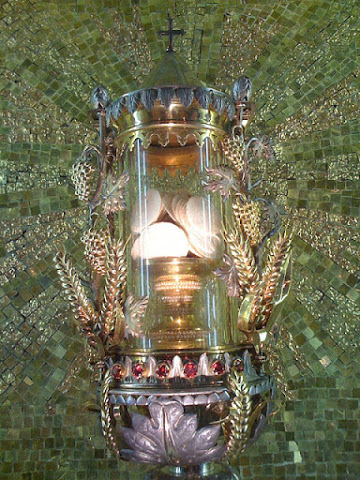 From a reader…
From a reader…
QUAERITUR:
If someone breaks the tabernacle takes the consecrated Hosts
desecrates (throws away to the gutters or dirty place) does the real presence exists?
There are some distinctions to be made here.
Firstly, the person who does such a thing would be committing a crime (breaking the tabernacle and theft) and also, objectively, a terrible sin (because the Eucharist isn’t just a thing, it is the Body, Blood, Soul, and Divinity of Christ). If such a person knew that and, being of sound mind, willingly did it anyway, she would be guilty of a truly horrible sin.
Also, such an action, throwing away the Blessed Sacrament, would under the usual conditions (commission of the mortal sin) incur automatically an excommunication which could only be lifted by the Holy See.
In the Latin Code of Canon Law we find:
can. 1367: Qui species consecratas abicit aut in sacrilegum finem abducit vel retinet in excommunicationem latae sententiae Sedi Apostolicae reservatam incurrit; clericus praeterea alia poena, non exclusa dimissione e statu clericali, puniri potest … A person who throws away the consecrated species or takes or retains them for a sacrilegious purpose incurs a latae sententiae excommunication reserved to the Apostolic See; moreover, a cleric can be punished with another penalty, not excluding dismissal from the clerical state..
The word abicit, abicere, means here “throw away”, and this was clarified by the Pontifical Council for the Interpretation of Legislative Texts, at their plenary session on 4 June 1999, as not … NOT… being restricted to “throw away” in a spirit of contempt, or intent to do dishonor. It really does mean “throw away”, which is what happens when you put a consecrated Host or the Precious Blood down a sacrarium without first making sure that the substance of the same is first broken down (by dissolving). Precious Blood, of course, should be consumed.
That said, in the case of any objectively sinful act which incurs an excommunication (e.g., throwing away the Eucharist), there are always the circumstances to be considered (e.g., the person’s will and knowledge, external compulsion, fear, etc.).
Redemptionis Sacramentum distinguished different levels of liturgical abuses. The worst are in the category graviora delicata (graver crimes). Among the graviora delicta is throwing away the Eucharist (cf. RS 172). This grave crime is reserved to the Congregation for the Doctrine of the Faith.
Whether the Real Presence continues or not depends on the condition of the Hosts.
So long as the outward appearance, the accidents, of bread remain recognizable, the Eucharist remain, the Real Presence of Christ remains. As soon as the hosts break down and are no long recognizable in their accidents as bread, then what is there is not the Eucharist, Christ’s presence is no longer there. If the place is very wet, that will happen faster. If a little damp, slower. Much depends on the place where they are thrown.
There are, however, also cases of Eucharistic miracles, namely, when Hosts have been preserved from dissolution in very harsh conditions or for a very long period. For example, in 1730 in Siena, Italy, thieves stole a tabernacle that contained hosts. Some days later, the hosts were fond in an alms box in a church. The hosts were cleaned and venerated out of reparation for the terrible sacrilege that had been committed. The hosts were then preserved. Over the years, they remained perfectly normal, without any indication of dissolution or decay, which will happen to host over time with changes of humidity, etc. Fifty years later, the bishop had the remaining hosts reserved. At one point, some unconsecrated hosts were preserved in a similar way, but they were soon reduced to dust or eaten by worms. Over the years the miraculous hosts have been examined. They miraculously remain to this day, contrary to all laws of nature.


































This question brings to mind the following touching story that was told by Fulton Sheen as one of his inspirations for making a daily Holy Hour:
https://www.americaneedsfatima.org/Conversions/the-little-girl-who-inspired-archbishop-fulton-sheen-s-vow.html